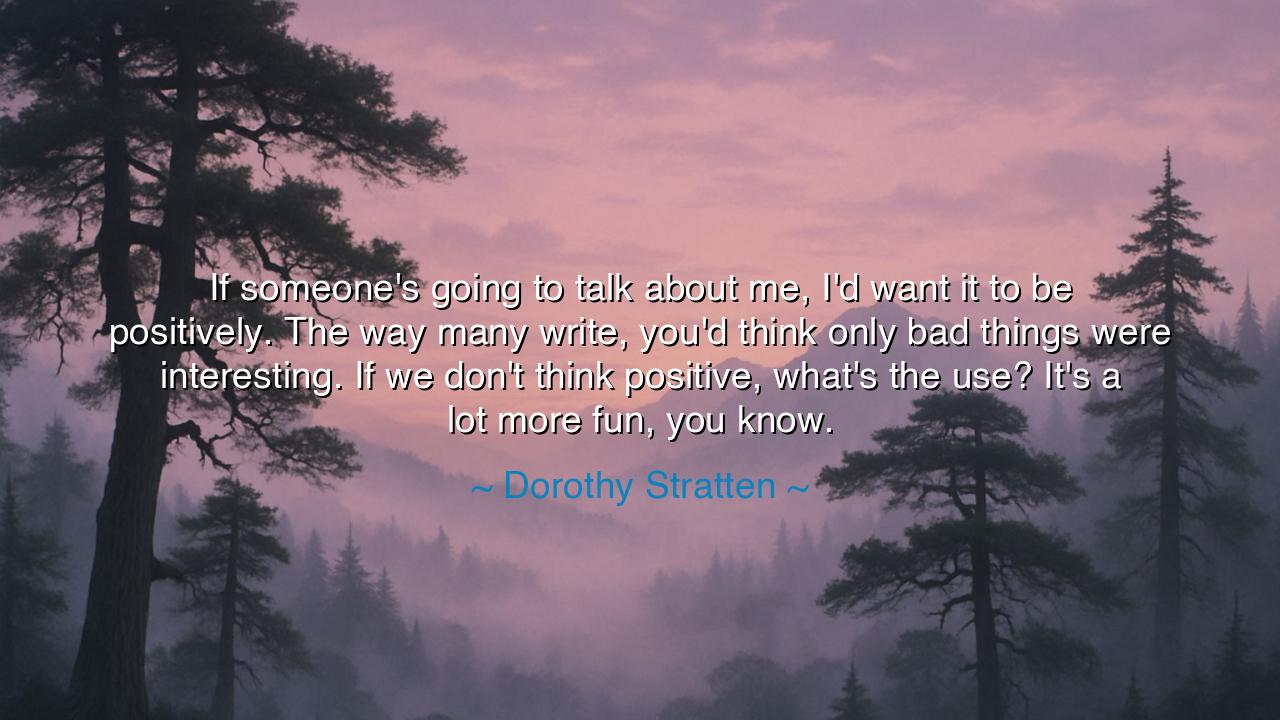
If someone's going to talk about me, I'd want it to be
If someone's going to talk about me, I'd want it to be positively. The way many write, you'd think only bad things were interesting. If we don't think positive, what's the use? It's a lot more fun, you know.






Dorothy Stratten, whose life was as brief as it was radiant, once said: “If someone’s going to talk about me, I’d want it to be positively. The way many write, you’d think only bad things were interesting. If we don’t think positive, what’s the use? It’s a lot more fun, you know.” In these words, spoken before her tragic death, we hear not naivety, but the wisdom of one who understood the cruelty of the world’s gaze. She knew that fame often invites not honor, but gossip, and that too many are quick to magnify shadows while ignoring the light.
The heart of her words is a defense of positivity, not as denial of hardship, but as a chosen way of living. She reminds us that to dwell upon darkness is easy, but to celebrate the good is the higher path. If we cannot think positively, she asks, what is the use of life at all? It is joy, not misery, that makes existence worth enduring, and kindness, not cruelty, that makes memory worth preserving. Her voice carries the timeless truth that life, however fleeting, must be honored by how we choose to frame it.
History shows us how the lens of remembrance shapes destiny. Consider Anne Frank, who in her hiding place amidst terror chose to write not only of fear but of hope, believing still in the goodness of people. Like Stratten, she might have focused on despair, but instead she left to the world a legacy of positive thought, a testament that even in the darkest times, the human spirit can choose light. Their stories echo together: to be remembered for courage and joy is a greater victory than to be defined by suffering.
Dorothy’s reflection also exposes the flaw of those who hunger only for scandal. She challenges us to ask: why should tragedy be more interesting than triumph? Why should failure attract more voices than success? The truth she speaks is this—that in exalting the negative, we starve the soul, but in celebrating the good, we multiply it. Her words remind us that memory itself is a battlefield, and each of us must choose whether to plant weeds or flowers in the garden of another’s legacy.
Let this wisdom endure: speak of others with grace, seek out the light in their lives, and remember them by the good they carried. For if we honor only the darkness, we become keepers of shadows. But if we honor the positive, we keep alive the flame that gives warmth to generations. Dorothy Stratten, though silenced too soon, left behind this eternal teaching: it is more fun, more noble, and more human to remember life with joy.






Dduykhang2010
This quote highlights an important idea: why are we so fixated on the negative? It’s refreshing to hear someone advocate for positivity, but it also makes me wonder—does this mindset overlook important aspects of life, like the lessons we learn from hardship? While I agree that focusing on the good is uplifting, can we truly ignore the bad, or is it about balancing both perspectives?
TNNguyen Thi Tuyet Nhi
Dorothy Stratten’s take on the power of positivity really challenges the common narrative. So many of us are conditioned to think that negativity or drama is what makes a story interesting, but I think she’s right—focusing on the positive could be far more fulfilling. Could it be that embracing positivity is a choice we can make every day, even when faced with challenging circumstances?
DTDoAn ThAi
I love the idea that thinking positively makes life more fun. It feels like there’s a cultural obsession with negativity—whether in the media or personal gossip—but doesn’t focusing on the positive have its own power? I wonder, though, can we completely ignore negative aspects of life? Shouldn’t there be room to acknowledge both the good and the bad to get a complete picture?
SHSang Hoang
This quote resonates with me because it touches on how often negativity dominates media and conversation. It’s almost as if bad things are considered more newsworthy. But can you truly live a happy life if you always focus on the negative? It makes me think about how much more we could appreciate in life if we chose to highlight the positive instead of always seeking the drama or controversy.
GDGold D.dragon
I can totally understand Dorothy Stratten’s perspective here. It seems like society is often drawn to negative stories, but why do we focus so much on the bad rather than celebrating the positive? Is it because negativity is considered more dramatic or interesting? I wonder how much we lose out on by not highlighting positive stories, especially in a world that could use more uplifting narratives.